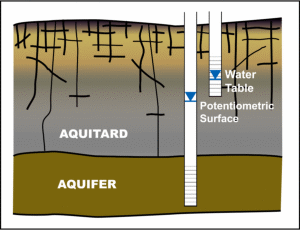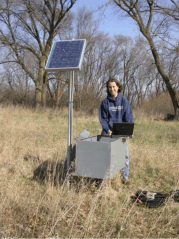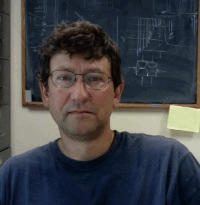
HYDROGEOLOGY OF AQUITARDS AND
LOW-PERMEABILITY MATERIALS:
Part 2, Head Distributions, Vertical Gradients
and Solute Transport
An understanding of the meaning and measurement of hydraulic gradients is essential for correct analysis and interpretation of groundwater flow and solute transport calculations in low-permeability materials.
Solute transport and contaminant migration can be tricky calculations within aquitards. This webinar series presents some critical elements about solute transport in terms of aquitard integrity.
This 90-minute webinar will review the characteristics of hydraulic head distributions in low-K materials and show how aquitards impact groundwater flow paths. The instructors will demonstrate how to construct diagnostic plots of hydraulic head profiles that provide immediate insight into groundwater movement and heterogeneity at any field site. Such plots are essential for correctly designing groundwater monitoring systems, selecting monitoring locations, and interpreting monitoring results. The webinar will also cover the definition and significance of a water table in low-K settings and evidence for or against perched conditions. Participants will undertake a hands-on exercise demonstrating the hydraulic concepts presented.

Apply webinar topics to any low-permeability setting
The webinar will demonstrate the effects of aquitards on groundwater flow and well response and show how typical monitoring well configurations can yield useless or misleading information in low-permeability settings. All materials presented will be geared to practical application in the field with the goal of improving hydrogeologic characterization.
Topics:
- Summary of aquitard hydraulics
- How aquitards refract flow lines
- Diagnostic plots of hydraulic head profiles
- Relationships between hydraulic gradients, hydraulic conductivity, and groundwater flow rates
- Effects of transient conditions
- Do's and Don'ts of calculating solute transport in aquitards
- Evidence for (and against) perched conditions
- Example problem
| Fee: |
299.00 USD Per Computer Site (unlimited participants per site)
249.00 USD Per Computer Site for our Members
199.00 USD Per Computer Site (unlimited participants per site)
when Members also register for the following Webinar:

(discount will be applied during checkout when both are in your cart)
Pay one site registration fee and an unlimited number of participants from your organization can attend at that site.
|
| Instructors: |
Madeline Gotkowitz, PhD and
David Hart, PhD, PG
|
| Handouts: |
Copy of Webinar Slides (pdf)
Record of Attendance Form (pdf)
|
| Duration: |
1.5 hour plus Q&A
(no restrictions on time limit for extra Q&A!)
|
Professional
Development: |
Earn 1.5 Professional Development Hours (1.5 PDH)
 |
A Record of Attendance Form is included free with each webinar for your record keeping and individual PDH verification. We ask your on-site coordinator to return the completed and signed copy of the Form to us following the webinar for (1) maintaining a separate copy as a service to attendees and (2) forwarding to NIU confirming attendance for those who order certificates.
Attendees may also order an official a Course Completion Certificate from Northern Illinois University for a small administrative fee. The Certificate is optional and may be ordered separately following the webinar to confirm your attendance and showcase the certificate on your office wall. Instructions for ordering certificates are given during the webinar.

* This webinar is eligible for the 'BUY THREE, GET THREE' discount; however ANY webinar series discount shown above cannot be combined with it.
Attendees will be invited to actively participate during this live and interactive on-line web seminar. Discussion is planned following the webinar for those who want to continue the session. Bring your questions to the webinar and present them to the instructor and other participants for exploring the best solution.
Instructors Bio
Madeline Gotkowitz, PhD
Hydrogeologist, Wisconsin Geological and Natural History Survey
Associate Professor, University of Wisconsin - Extension
 Madeline Gotkowitz is a research scientist at the Wisconsin Geological and Natural History Survey, where her work focuses on regional groundwater flow and transport modeling, subsurface fate and transport of human enteric viruses, and flow and transport across aquitards. Gotkowitz's field-based investigations of arsenic in groundwater address conditions in surficial and bedrock aquifers, and the affect of well disinfection on arsenic release. Gotkowitz holds a B.A. in Environmental Sciences from Smith College and an M.S. in Hydrology from New Mexico Institute of Mining and Technology.
Madeline Gotkowitz is a research scientist at the Wisconsin Geological and Natural History Survey, where her work focuses on regional groundwater flow and transport modeling, subsurface fate and transport of human enteric viruses, and flow and transport across aquitards. Gotkowitz's field-based investigations of arsenic in groundwater address conditions in surficial and bedrock aquifers, and the affect of well disinfection on arsenic release. Gotkowitz holds a B.A. in Environmental Sciences from Smith College and an M.S. in Hydrology from New Mexico Institute of Mining and Technology.
David Hart, PhD, PG
 Dave Hart is a hydrogeologist/geophysicist with the Wisconsin Geological and Natural History Survey and an associate professor at the University of Wisconsin-Extension.
Dave Hart is a hydrogeologist/geophysicist with the Wisconsin Geological and Natural History Survey and an associate professor at the University of Wisconsin-Extension.
Dave's applied research includes regional groundwater flow and recharge in southeastern Wisconsin, near-surface geophysics, and measurement of porosities and permeabilities in aquifers and aquitards. Prior to joining the university, he served as a hydrogeologist with Eder Associates. He is an associate editor for Ground Water and past president of the AWRA - Wisconsin Section.